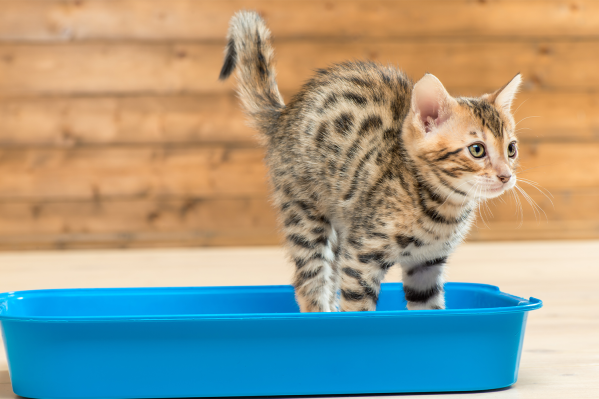Having a new kitten is exciting in plenty of ways, but when it comes to training them, it can be quite the opposite. While it can be mundane and repetitive, the effort you invest in training them upfront will prove well worth it.
One of the most important things your young kitten will learn how to do is successfully use the litter box. While it’s true that most kittens have an understanding of how to do this on their own, they can always use a refresher. It's important to take the necessary steps to set them up for success.
If your new kitten is not using their litter box, making a few simple tweaks can make a sizable difference.
Here's what you need to know about helping a new kitten that is struggling to use their litter box.
Why won’t my kitten use the litter box?
If your kitten will not use their litter box, the key to fixing the problem is getting to the bottom of why they're reluctant to use it.
It’s your job as your kitten’s pet parent to help them become more comfortable with their litter box. Luckily, there are some simple steps you can take to help with your cat's litter box problems.
Read on to learn more about some common reasons that kittens will not use litter boxes.
It’s hard to access
Sometimes, the location is to blame for your cat’s reluctance to use their litter box. If the litter box is in a place that's tricky to access, this could be culprit. To fix this, you can try to put their litter box in a more accessible place.
Choose somewhere that doesn't have a lot of foot traffic so they feel comfortable going. At the same time, if it's too far out of the way, this could also be an issue. Another solution is to give your cat several litter boxes so they can use the one that they're closest to. The rule of thumb with cats and litter boxes is two litter boxes to every cat.
It’s uncomfortable or unclean
Sometimes, cats don't like using litter boxes that have been urinated or defecated in. Be sure to scoop your cat’s litter box often so that it's not dirty or messy.
If you have a multi-cat household, another cat could possibly be using that litter box and dirtying it for the new kitten—you'll want to make sure this isn't happening. Cats don't enjoy foul odors, so if there’s any scent of that in your cat’s litter box, they'll likely stay away from it and can lead to inappropriate elimination elsewhere.
Take note that if you are pregnant or thinking of conceiving, there is a potential risk associated with Toxoplasma and cleaning litter boxes.
You’re using new litter
Some cats have a preference about what type of litter goes in their litter box. If your cat is comfortable with one brand of litter and you recently switched to a different one, they might have some discomfort with the new litter. Most cats will accept a fine granule like a clumping, scoopable litter.
Your kitten is stressed
Cats struggling with elimination in the wrong place could be a sign that they're experiencing stress.
Cats don't like it when their litter box is in a place where they can be startled when they're doing their business. If that has happened in the past, they may be stressed that it's going to occur again. This is why you should select a location that offers your kitten privacy and quiet, but is not too far out of the way that it’s inaccessible.
There are pheromone diffusers and sprays available to help reduce stress and anxiety with cats, especially in a multiple cat household. Feliway is available in a plug-in diffuser and spray.
There’s conflict between your cats
Another reason why your kitten might not be using their litter box is because there's a conflict between them and another cat in your household. Perhaps a more senior cat attempts to terrorize your young kitten when they're using the litter box—this could lead your new kitten to be reluctant to use it.
Your kitten has a medical problem
Sometimes, the fact that your new kitten does not want to use their litter box can suggest that they actually have a medical problem that needs to be addressed.
Any type of condition that would impact your cat’s ability to urinate or defecate can impact their willingness to use their litter box. This includes a urinary tract infection, as well as kidney or thyroid diseases. Diabetes could also be to blame.
Your kitten is urine marking
Your kitten might be attempting to mark their territory by urinating outside of their litter box. This is especially likely if your kitten is an unneutered male cat. Your cat might also be spraying because they detect a threat in their territory.
How to train your kitten to use the litter box
There are some steps that you can take to encourage your new kitten to use their litter box. Try these first, and if you find that they're unsuccessful, you should certainly reach out to a veterinarian or Pawp Professional.
Clean their litter box regularly
The first thing that you should do is ensure that your cat has a clean, tidy litter box. Cats dislike odors and prefer litter boxes that are clean. You should not only clean out your litter box when your cat urinates or defecates, but also complete a deep cleaning occasionally. Unscented soap is best.
Or, you can always give your cat a litter box for urinating and a litter box for defecating. This might help solve the problem.
Try new litter, new boxes, or new locations
If the current litter box isn’t working, you might have to make some changes. The first thing you can do is move the litter box to a different location that will give them privacy but is not inaccessible. It should be in a place that is not near loud, noisy appliances (like the washer and dryer) or too much foot traffic.
Your cat might also dislike the litter texture (or liner, if you have one), so you can try something different. There are many options, including clumping litter, clay litter, and more. Cats tend to dig and bury their elimination, so the litter type is critical.
Sometimes, the box itself is why your cat is having a problem. If your cat is not defecating in the box, it could be because they feel the box is claustrophobic. Some cats have preferences for covered litter boxes, while others prefer the uncovered variety.
Eliminate other sources of stress
You should also ensure that your cat is not stressed out. This could lead to trouble defecating and urinating in the right place. If you feel that your other cat is causing problems and leading to stress for your kitten, you'll need to address this.
Help develop pleasant associations
If your cat goes in the litter box and does their business there, you can give them a treat and some praise. This could help them create a pleasant association with going to the bathroom in their litter box. Place their favorite toys nearby as well.
Make other areas less appealing
Lastly, you could try to make the other places where they go to the bathroom seem less appealing. You can do this by making their litter box the ideal toilet. This means using substrates that they’ll be more comfortable with, an additional box, a larger box, and creating positive associations with the box.
If your cat is using inappropriate places to release themselves, enzyme cleaners can help eliminate the smell of their urine or feces. This will help make this spot less enticing for the future.
When should I take my kitten to the vet?
It’s never a bad idea to explain to your vet what's going on and get their opinion on what you should do to help your cat. They'll be able to tell you if the reason that your kitten is urinating outside of their litter box is connected to a medical cause. Once they rule that out, they might suggest what you could do to improve this behavior.
When your new kitten is not using the litter box, there are plenty of steps that you can take to set your feline on the right path. If you have questions about your cat’s elimination habits, ask the Pros at Pawp. We're available wherever and whenever through telehealth visits to answer questions about your pet.

Reviewed and fact-checked by
Mika, RVT at Pawp
